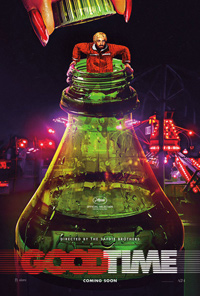White is Right: Pattinson Shines in the Grime of the Safdie Bros. Urban Squalor
 American indie directors Joshua and Ben Safdie craft their most polished effort to date with fourth feature Good Time, a character driven heist thriller headlined by Robert Pattinson. Another reflection of desperate lives lost in the multitudinous sea of New York City’s down and out strata, this compounded nightmare of a narrative is enhanced by an inescapable underlying theme of white privilege not only serving as the subconscious dramatic catalyst for its woebegone protagonists, but part of the systemic and invisible racist stereotyping which allows them elusiveness. Pattinson once again proves his abilities to disappear into a fully fleshed out characterization, here as a selfish yet sympathetic deadbeat.
American indie directors Joshua and Ben Safdie craft their most polished effort to date with fourth feature Good Time, a character driven heist thriller headlined by Robert Pattinson. Another reflection of desperate lives lost in the multitudinous sea of New York City’s down and out strata, this compounded nightmare of a narrative is enhanced by an inescapable underlying theme of white privilege not only serving as the subconscious dramatic catalyst for its woebegone protagonists, but part of the systemic and invisible racist stereotyping which allows them elusiveness. Pattinson once again proves his abilities to disappear into a fully fleshed out characterization, here as a selfish yet sympathetic deadbeat.
Brothers Constantine (Pattinson) and Nick Nikas (Ben Safdie) are struggling for a way to escape their troubled lives. Nick, a vulnerable adult who lives with their grandmother, recently injured the old woman during a volatile fight. As an effort to take his brother away and provide a better life for both of them, Connie makes Nick assist him in robbing a bank. But when the situation goes horribly wrong and Nick is nabbed by the police, Connie embarks on a strenuous journey to release his brother on bail with the help of the troubled Corey (Jennifer Jason Leigh). Learning Nick has been hospitalized following an altercation, Connie proceeds to abduct his injured brother, leading to a strenuous night of mounting desperation.
Good Time codes itself in an opening sequence where an equally superb Ben Safdie’s Nick Nikas is questioned plaintively by a social worker trying to determine his cognitive abilities. Their lesson begins with the identification of popular idioms, and as we come to realize the ingrained nature of Good Time’s racial codes brings to bind “a spade a spade,” as the film never bluntly speaks out about the white privilege of Connie and Nick but obviously dances around it with every social interaction.
Masquerading as black men (who notably accost a black bank teller) during their robbery, this sort of criminal black face recalls Robert Altman’s 1996 Kansas City (a film which also stars Jennifer Jason Leigh), wherein Dermot Mulroney pulls the same stunt with the same implications concerning law enforcement’s zealotry in detaining perceived non-white criminals. The manipulations continue from there, both in how Connie is able to fly under the radar despite his suspect behavior in a hospital and wheedle his way into the home of a kindly black woman in the middle of the night (something which would most likely not happen in a racially reversed scenario). Later, Connie, in an effort to disguise himself, dyes his hair blond, which also doubles as a way to make himself whiter.
The motive for the robbery is alluded to briefly in a conversation Nick screams at his grandmother—the brothers had plans to buy a private cabin and live their lives outside of an economic system which has hampered them from thriving the way (at least Connie) believes they are entitled to. “Is that how you see yourself?” he asks his brother after yanking him away from the social worker, referring to the other vulnerable adults in the building. This is made more evident when Connie finally has a falling out with Buddy Duress’ (of Heaven Knows What) alcoholic Ray, a man who mistakenly becomes embroiled in Connie’s string of errors and whom he believes himself to be better than.
Supporting characters played by Jennifer Jason Leigh (in a memorably unhinged moment at the bail bondsman’s) and Barkhad Abdi as a security guard (whom Connie eventually impersonates, also a switch made possible due to race stereotypes) pad out the Safdie Bros. expertly calibrated environment in this efficiently streamlined narrative which is comparable to early Scorsese vehicles, particularly Mean Streets.
Returning DP Sean Price Williams (who also worked on Alex Ross Perry’s Queen of Earth and Listen Up Philip) once again captures an unseemly side of New York City, while an extended sequence in an amusement park allows for some striking visuals. Best of all, a fantastically ambient score from 0PN ft. Iggy Pop recalls the glorious heyday of Tangerine Dream.
Reviewed on May 25th at the 2017 Cannes Film Festival – Main Competition. 100 Mins.
★★★½/☆☆☆☆☆


